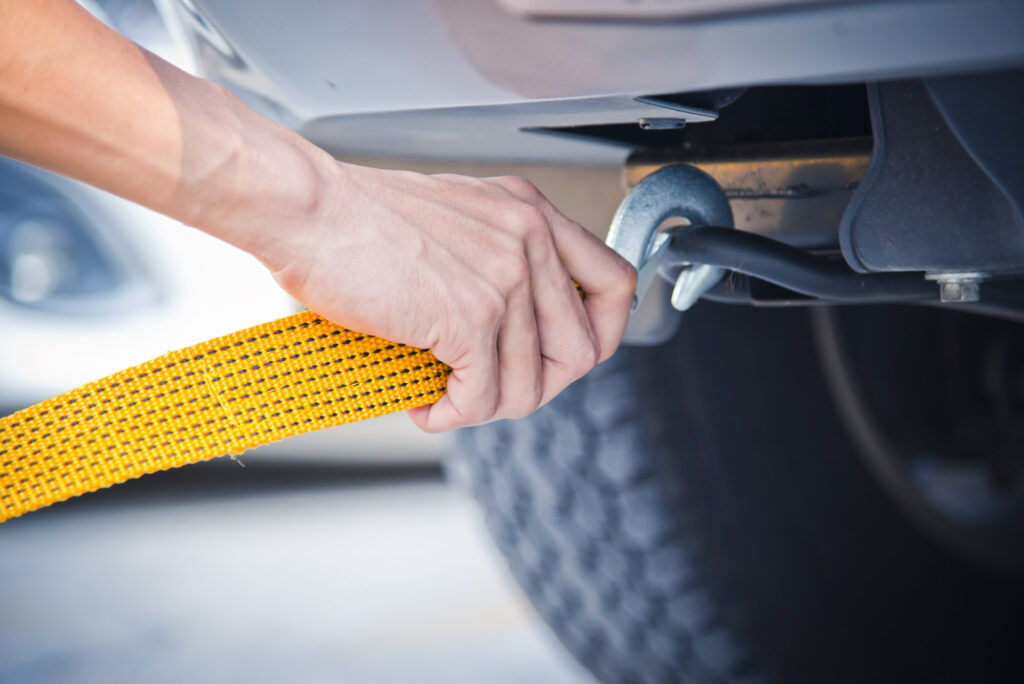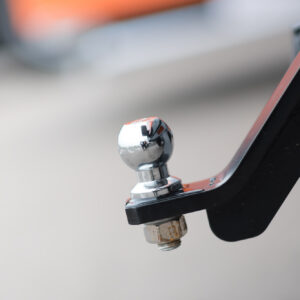If your car breaks down, you must rely on a towing service to reach the nearest auto repair shop. That can mean waiting hours for assistance. And if your insurance doesn’t cover the towing service, you’ll have to shoulder the cost.
Luckily, with tow straps and the help of a friendly car owner, you can handle the task on your own, saving time and money.
What Are Tow Straps?
Tow straps are used to tow a vehicle. They have hooks that you can attach to your ride and the towing vehicle. These straps usually come in various lengths and widths, depending on the weight of the vehicle they’re designed to tow.
Recovery Straps vs. Tow Straps
While they serve a similar purpose, tow straps and recovery straps are most effective in certain circumstances.
Tow straps work best when they’re towing cars on flat surfaces, like roads and highways. They’re made with polyester or polypropylene, which means they’re durable but resistant to stretching.
Recovery or snatch straps are specially designed for recovery situations, like when a vehicle is stuck in mud or snow. This type of pull strap is usually made of flexible nylon, which means it can stretch and recoil, creating the kinetic energy needed to pull the vehicle out of the mud.
When choosing straps for a particular use, you should consider those that won’t cause damage if they break or come loose. This could involve selecting materials or designs that minimize the risk of injury or damage to nearby objects or surfaces in the event of a failure.
How to Use a Tow Strap

Using a tow strap is not rocket science. Here’s what the process usually involves:
Look for a Bigger Vehicle
Any friend can help you out when your vehicle needs a tow. However, your helper must have a vehicle with a stronger engine and higher towing capacity than yours.
For example, if you own a pickup truck, a sedan or compact car can’t tow your vehicle.
Find the Attachment Points of Both Vehicles
The mounting point is usually near the front of most vehicles. If you’re not sure where yours is, you can always refer to your owner’s manual for the exact location.
Attach the Tow Strap
Attach the one end to the tow strap to your vehicle’s mounting point. Then, connect the other end of the strap to the towing vehicle’s attachment point.
Depending on the vehicles, you might need to use a pair of D-rings or shackles to connect them properly.
Inspect the connections. Both ends of the strap should be securely hooked to both your vehicle and the towing vehicle to avoid accidents during the tow.
Plan Your Route
Discuss the route with your friend or tow driver. As much as possible, avoid congested areas and high-speed roads.
Ensure the Vehicle Is Ready for Towing
Get in your vehicle and make sure that the parking brake is disengaged. Put the vehicle in Neutral as well to minimize resistance and ensure the vehicle will roll freely while it’s being towed.
Start the Towing Process
Once you’re ready, the towing vehicle can start accelerating slowly. The tow driver should avoid any sudden acceleration and braking.

How to Choose the Right Pull Strap for Your Vehicle
Choosing the right tow strap for your ride can be quite challenging, especially if it’s your first time to buy one. Here are some factors to consider when shopping for a tow strap:
Vehicle Weight
When choosing a tow strap, you’ll have to consider what type of vehicle you have and how much it weighs because that will dictate the length of the tow strap you need.
Ideally, you should buy a tow strap with a breaking strength that’s three times your vehicle’s weight. For example, if your vehicle weighs around 3,300 pounds, you’ll need a tow strap with a rating of not less than 9,900 pounds.
Quality
Make sure the tow strap you buy complies with industry standards. Low-quality straps can break after a few uses or, worse, while you’re using them.
There are many high-quality straps out there sold at competitive prices, so finding a durable one for your ride will be easy.
Attachment Points
Ensure the tow strap you choose has sturdy hooks or loops. Look for a strap with reinforced stitching and durable polyester material to avoid accidents while towing.
Storage
It’s best to choose a tow strap that’s easy to store. Tow straps that come with storage bags are a great choice because it’s easy to keep them safe and clean when they’re not in use.
How Much Are Tow Straps?
Basic tow straps are priced anywhere between $50 and $100. Prices can vary depending on the strap’s brand, length, and quality.
Special straps, like recovery or snatch straps, are usually more expensive than a basic tow strap. Also, before buying a tow strap or any vehicle accessory, make sure that it’s compatible with your vehicle to avoid issues down the road.
Tow Strap Maintenance
Keep your towing strap away from direct sunlight or moisture. Store it in a cool, dry area.
Before using your tow strap, make sure to inspect it for any signs of wear. Look for fraying, cuts, and abrasions. Also, check the hooks for any damage or corrosion.
If you notice anything wrong with your tow strap, replace it right away. It’s better to shell out money for a new tow strap than risk towing a vehicle using a damaged strap.
Remember to always prioritize safety while on the road, and drive safely!
Get Towing Straps for Your Vehicle
Is there anything worse than waiting hours for your towing service to arrive? Nobody wants to spend their afternoon stuck beside the road with a vehicle that won’t run. While you can’t always prevent this, you can make preparations. High-quality tow straps are a great investment that can help you get out of a pinch. You can also use them to help others too. Prepare for the worst and get your own towing straps from CarParts.com.
CarParts.com offers a wide selection of high-quality towing straps at different price points. Enjoy the best deals every time, thanks to our price match guarantee. If you find a competitor selling the same product at a lower price, let us know and we’ll either match or beat the price on the spot. Our strategically located warehouses also allow us to process your order efficiently. As long as you order by 12 PM ET, you can expect your new tow straps to arrive in as fast as two business days.
Don’t wait until you get stuck in the middle of nowhere before investing in tow straps. Check out our wide selection of tow straps at CarParts.com and get one today!
Any information provided on this Website is for informational purposes only and is not intended to replace consultation with a professional mechanic. The accuracy and timeliness of the information may change from the time of publication.



























